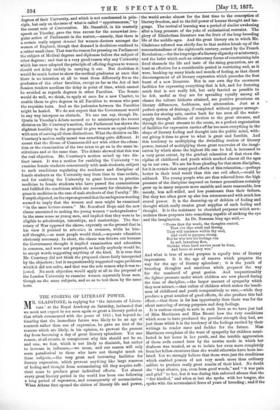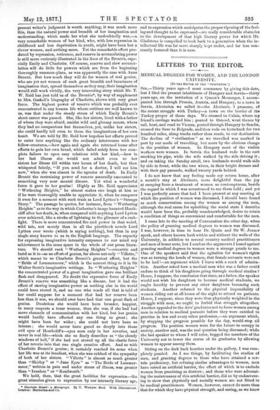THE STORING OF LITERARY POWER.
AIR. GLADSTONE, in replying for ' the interests of Litera- ture' at the Royal Academy on Saturday, intimated that we must not expect to see soon again so great a literary period as that which commenced with the peace of 1815 ; but beyond in- timating that the immediate future was likely to be an age of research rather than one of expression, be gave no hint of the reasons which are likely, in his opinion, to prevent the present day from becoming a day of great literary splendour. Yet one reason, at all events, is conspicuous why this should not be so, and one, we fear, which is not likely to diminish, but rather to increase in influence,—we mean, and our reason will only seem paradoxical to those who have not thought much on these subjects,—the very great and increasing facilities for literary expression, which prevent anything like large reserves of feeling and thought from accumulating till they acquire suffi- cient mass to produce great individual effects. Yet almost every great literary period in the world has been one following a long period of repression, and consequently of accumulation. When Athens first opened the sluices of literary life and power,
the world awoke almost for the first time to the conception of literary freedom, and to the fall power of human thought and lan- guage. The revival of learning was a period of similar awakening after a long pressure of the yoke of ecclesiastical restraint. The glory of Elizabethan literature was the fruit of the long-brooding life of the middle-ages. And the great literary era to which Mr. Gladstone referred was chiefly due to that sudden break-up of the conventionalisms of the eighteenth century, caused by the French Revolution ; —for the long reign of a literary oligarchy or aristocracy, and the habit which such an aristocracy forms of constraining into fixed channels the life and taste of the rising generation, are at least as effective for a considerable period in restricting and, as it were, banking-up many kinds and moods of feeling, as that direct discouragement of all literary expression which precedes the first burst of a new literature. But in our own day the enormous facilities for expressing everything that is felt, and for fostering much that is not really felt, but only fancied as possible to be felt, useful as they are for spreading equally among all classes the culture hitherto attained, are positive premiums on literary diffuseness, feebleness, and attenuation. Just as a perfect system of drainage, if completed without proper arrange- ments for storing rain, carries back far too soon all the water- supply through millions of rivulets to the great streams, and through the great streams to the ocean, so a perfect organisation of facilities for expression carries off far too soon everything in the shape of literary feeling and thought into the public mind, with- out giving it time to grow to what is great and forcible. And this tendency to multiplying the dwindling runlets of literary power, instead of multiplying those great reservoirs of the imagi- nation by which alone the highest life can be fed, is increased to a very great extent, by the gradual relaxation of that stern dis- cipline of childhood and youth which marked almost all the ages up to our own. We are far from pleading for that stern discipline, for it is certain that many good effects of this relaxation,—perhaps better in their total result than this one evil effect,—could be adduced. The young people who are thus relieved from the high pressure of the discipline imposed on former generations certainly grow up in many respects more amiable and more reasonable, less moody, less self-willed, and less passionate than their fathers. But they too often grow up also less strenuous and with much less stored power. it is the damming-up of driblets of feeling and thought which really creates great supplies of such feeling and thought. It is the resistance to cherished purposes which accu- mulates these purposes into something capable of striking the eye and the imagination. As Dr. Newman long ago said,—
" Prune thou thy words, the thoughts control,
That o'er thee swell and throng.
They will condense within thy soul, And swell to purpose strong.
But he who lets his feelings run In soft, luxurious flow, Shrinks when hard service must be done, And faints at every woe."
And what is true of moral purpose is equally true of literary impressions. It is the age of reserve which prepares the way for the age of literary splendour ; it is the youth of brooding thoughts and emotions which prepared the way for the manhood of great genius. And unquestionably the lighter pressure under which children are now placed during the time of discipline, —the larger amount of sympathy which they now attract,—that cultus of children which makes the loneli- ness of childhood and youth comparatively so rare,—while they produce a great number of good effects, do also produce this bad effect,—that there is far less opportunity than there was for the silent maturing of strong purposes and deep feelings.
It is curious enough to note in such lives as we have just had of Miss Martineau and Miss Brontb how the very conditions which seem to have produced the peculiar strength they bad, are just those which it is the tendency of the feelings excited by their writings to render rarer and feebler for the future. Miss Martineau complains of the want of sympathy for children mani- fested in her home in her youth, and the terrible aggravation of those evils caused later by the unwise mode in which her deafness was treated, so as to isolate her even more completely from her fellow-creatures than she would otherwise have been iso- lated. Yet we strongly believe that these were just the conditions which enabled powers of not very much more than ordinary calibre to produce really great results of their kind. No doubt she " kept silence, yea, even from good words," and " it was pain and grief " to her, but it was during this enforced silence that the "fire kindled," and when at last she spoke with her tongue, she spoke with the accumulated force of years of brooding ; and if the present writer's judgment is worth anything, it was much more ' this, than the natural power and breadth of her imagination and understanding, which made her what she undoubtedly was,—a very remarkable woman of her kind, who, with less repression in childhood and less deprivation in youth, might have been but a clever woman, and nothing more. Yet the remarkable effect pro- duced by repression, reticence, and reserve in accumulating power is still more curiously illustrated in the lives of the Brontës, espe- cially Emily and Charlotte. Of course, reserve and slow accumu- lation will do little for powers which are from the beginning thoroughly common-place, as was apparently the case with Anne Bronte. But how much they will do for women of real genius, who are yet not women of such great breadth and luxuriance of imagination that, spread themselves as they may, their imagination would still work vividly, the very interesting story which Mr. T. W. Reid has just told us of the Brontes*, by way of supplement to Mrs. Gaskell's biography of Charlotte, shows with very great force. The highest power of reserve which was probably ever concentrated in any human life whose outlines are well known to us, was that under the steady stress of which Emily Bronte's short career was passed. She, like her sisters, lived with a father of whom they were afraid, amidst wild and gloomy moors, where they had no companions but themselves, yet, unlike her sisters, she could hardly tell even to them the imaginations of her own heart. We are told by Mr. Reid how hopeless her efforts proved to enter into anything like the ordinary intercourse with her fellow-creatures,—how again and again she returned home after efforts to gain her own bread, which failed solely from her com- plete failure to open easy relations with her kind,—how in her last illness she would not admit even to her sisters her illness till within two hours of her death, but then whispered faintly, "If you send for a doctor, I will see him now," when she was almost in the agonies of death. In Emily Bronte the restraining power of reserve assuredly amounted to something very near mental disease. Yet what a wonderful force it gave to her genius ! Highly as Mr. Reid appreciates "Wuthering Heights," he almost makes one laugh at him as if he were thoroughly unable to appreciate it, when he compares it even for a moment with such trash as Lord Lytton's "Strange Story." The passage he quotes, for instance, from "Wuthering Heights " as to the way in which Catherine's image haunted Heath- cliff after her death, is, when compared with anything Lord Lytton ever achieved, like a stroke of lightning to the glimmer of a rush- light. There is more concentrated fire and power in that weird, wild tale, not merely than in all the pinchbeck novels Lord Lytton ever wrote (which is saying nothing), but than in any single story known to us in the English language. The capacity for expressing imaginative intensity surpasses to our mind any achievement in the same space in the whole of our prose litera- ture. We should rank " Wuthering Heights "—eccentric and lurid as it is—as an effort of genius, far above not only " Villette," which seems to us Charlotte Bronte's greatest effort, but the "Bride of Lammermoor," which is the nearest thing to it in Sir Walter Scott's imaginative writings. In " Wuthering Heights" the concentrated power of a great imagination gave one brilliant flash and disappeared. No doubt the repressive force of Emily Bronte's reserve was something like a disease, but it had the effect of storing imaginative power as nothing else in the world could have stored it, and no one who reads all that is told of her could suppose for a moment that had her reserve been less than it was, we should ever have had that one great flash of genius. Doubtless she would have been broader, happier, in many respects a traer woman, than she was, if she had had more channels of communication with her kind, but her genius would hardly have effected any one thing so great ; she might have been far wider ; she could not have been so intense ; she would never have gazed so deeply into those evil eyes of Heathcliff's—eyes seen only in her reveries, and never in real life—which she so finely describes as "the cloudy windows of hell," if she had not stored up all the elastic force of her reverie into that one single creative effort. And so with Charlotte Bronte's genius ; it certainly reached its acme when her life was at its loneliest, when she was robbed of the sympathy of both of her sisters. " Villette " is almost as much greater than "Shirley " or " Jane Eyre" as " The Bride of Lammer- moor," written in pain and under stress of illness, was greater than " Ivanhoe " or " Kenilworth."
We hold, then, that the great facilities for expression—the great stimulus given to expression by our intensely literary age,
• Ohaniotte froati: a Monograph. By T. Wemyes Reid. With Illustrations. London: Macmillan and Co.
and to expression which anticipates the proper ripening of the feel- ing and thought to be expressed—are really considerable obstacles to the development of that high literary power for which Mr. Gladstone is compelled to look back to a generation when the in- tellectual life was far more sharply kept under, and far less con- stantly fostered than it is now.



































 Previous page
Previous page